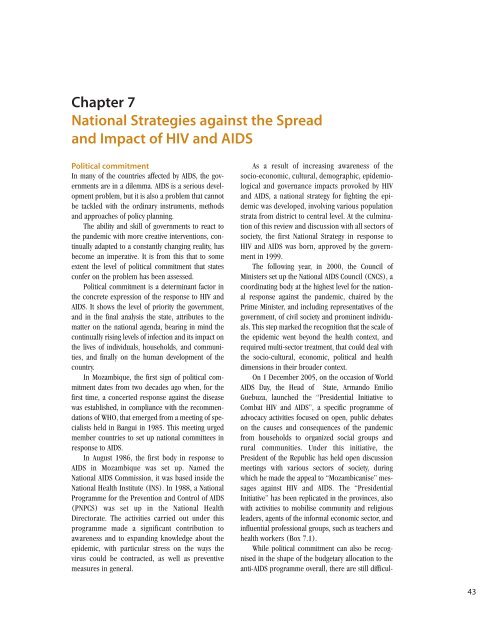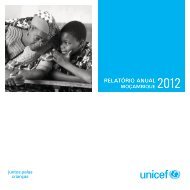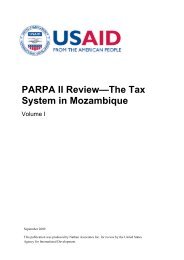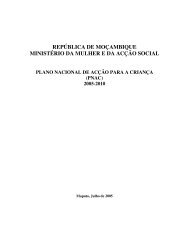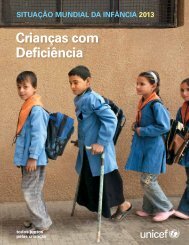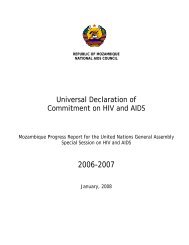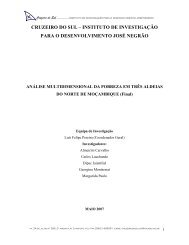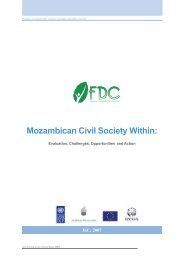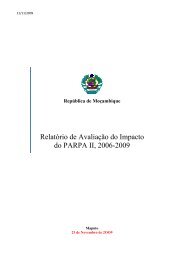Mozambique National <strong>Human</strong> <strong>Development</strong> Report 2007The nutrition factorIn the relationship between HIV and AIDS and foodsecurity, nutrition plays a significant role. Indeed, therole that good nutrition performs in the health andfunctioning of the human immunological system haslong been recognised. Good nutrition is thus a necessarycondition for any individual who is HIV positive,and to some extent, many people in this situationmight even need more focused assistance.People infected by HIV face enormous challengesas they struggle to keep up their nutritionalhealth. Inadequate diet increases people’s vulnerabilityto disease, and since the virus weakens thebody’s immune defences, opportunist infections tendto occur very frequently. Good nutrition helps toreduce this risk significantly.While all those infected by HIV need specialattention in food and nutritional terms, pregnantwomen who are infected need better nutrition inorder to reduce the likelihood of transmitting thevirus to their babies, and so that they can have a saferbirth. HIV-positive children have social nutritionalneeds so as to avoid retarding their normal developmentand help them survive.However, it is important to note that nutritionalneeds change over the course of infection and developmentof the disease. This change is influenced bythe nutritional state of the individual under normalconditions. The organism of individuals who weremalnourished before they contracted the virus will,now that they are HIV positive, require an increase inthe body’s energy intake, to confront the pressurethat the virus will impose on the immune system.HIV and AIDS, governanceand national securityThe effects of HIV and AIDS are gradually hamperingthe capacity and the administrative and organizationalpower of the state, globally. This has implicationsfor government effectiveness, particularly regardingthe provision of goods and services. The picturebecomes all the more worrying when it is knownthat, in Mozambique, the state remains the majorproducer, employer and provider of social and welfareservices, just as happens in most poor countries(Barnett & Whiteside, 2002).The sector impacts dealt with in the previouspages show that the threat posed by HIV and AIDS isnot limited only to the most vulnerable strata of thepopulation. In a situation of generalized epidemic, andfed by processes that accommodate the constructionof individual and social identity, the threat from HIVand AIDS is felt everywhere. There are signs that seniorstate and government cadres in various sectors ofactivity have died from the disease, although greatsecrecy still prevails over these deaths.Compliance with state duties through the provisionof public services is an imperative of governance.Pursuing this fully requires not only money,but above all, capable and motivated staff to complywith duties inherent to the public administration.Since a large part of the professional groups orspecialised areas in the state machinery – such as militaryand para-military personnel, the police forces orjudicial staff – are among the sectors with the highestrates of HIV prevalence, and with high mortality rates,carrying out the state’s mission, particularly as regardsbasic public security is not only threatened, but is alsoconfronted with new challenges.These challenges include, among others, theneed to define and implement preventive and correctivestrategies. This involves diverting budgetaryfunds, and continually realigning objectives, in order,for example, to recruit and train new technical staff.HIV and AIDS is a development question andshould be viewed as such. But at the same time it isa national emergency, and measures should be takento stabilize government action. Seen from this perspective,it is prudent to note that, in order to minimisethe adverse impacts the pandemic will imposeon state revenue and expenditure, political optionsthat combine prevention, treatment, and impact mitigationin a balanced manner should continue to bestrengthened and made more efficient.Because governance has the duty, among others,of establishing an environment of safety and stabilityfor its citizens, the threat posed by HIV and AIDSrequires that it be confronted with the example of adetermined and committed leadership. For peopletend to pay greater attention to, and value more highly,initiatives from their leaders when they go publicand break the taboos surrounding the pandemicwhich have to some extent contributed to discriminationand stigmatization in the community.As a national priority, the context in which thestruggle against HIV and AIDS should occur must beassumed straightaway as an act of governance, and itis in public fora where the government leadershipshould confront the factors that may help or hinderthe adoption of new behaviour.42
Chapter 7National Strategies against the Spreadand Impact of HIV and AIDSPolitical commitmentIn many of the countries affected by AIDS, the governmentsare in a dilemma. AIDS is a serious developmentproblem, but it is also a problem that cannotbe tackled with the ordinary instruments, methodsand approaches of policy planning.The ability and skill of governments to react tothe pandemic with more creative interventions, continuallyadapted to a constantly changing reality, hasbecome an imperative. It is from this that to someextent the level of political commitment that statesconfer on the problem has been assessed.Political commitment is a determinant factor inthe concrete expression of the response to HIV andAIDS. It shows the level of priority the government,and in the final analysis the state, attributes to thematter on the national agenda, bearing in mind thecontinually rising levels of infection and its impact onthe lives of individuals, households, and communities,and finally on the human development of thecountry.In Mozambique, the first sign of political commitmentdates from two decades ago when, for thefirst time, a concerted response against the diseasewas established, in compliance with the recommendationsof WHO, that emerged from a meeting of specialistsheld in Bangui in 1985. This meeting urgedmember countries to set up national committees inresponse to AIDS.In August 1986, the first body in response toAIDS in Mozambique was set up. Named theNational AIDS Commission, it was based inside theNational Health Institute (INS). In 1988, a NationalProgramme for the Prevention and Control of AIDS(PNPCS) was set up in the National HealthDirectorate. The activities carried out under thisprogramme made a significant contribution toawareness and to expanding knowledge about theepidemic, with particular stress on the ways thevirus could be contracted, as well as preventivemeasures in general.As a result of increasing awareness of thesocio-economic, cultural, demographic, epidemiologicaland governance impacts provoked by HIVand AIDS, a national strategy for fighting the epidemicwas developed, involving various populationstrata from district to central level. At the culminationof this review and discussion with all sectors ofsociety, the first National Strategy in response toHIV and AIDS was born, approved by the governmentin 1999.The following year, in 2000, the Council ofMinisters set up the National AIDS Council (CNCS), acoordinating body at the highest level for the nationalresponse against the pandemic, chaired by thePrime Minister, and including representatives of thegovernment, of civil society and prominent individuals.This step marked the recognition that the scale ofthe epidemic went beyond the health context, andrequired multi-sector treatment, that could deal withthe socio-cultural, economic, political and healthdimensions in their broader context.On 1 December 2005, on the occasion of WorldAIDS Day, the Head of State, Armando EmilioGuebuza, launched the “Presidential Initiative toCombat HIV and AIDS”, a specific programme ofadvocacy activities focused on open, public debateson the causes and consequences of the pandemicfrom households to organized social groups andrural communities. Under this initiative, thePresident of the Republic has held open discussionmeetings with various sectors of society, duringwhich he made the appeal to “Mozambicanise” messagesagainst HIV and AIDS. The “PresidentialInitiative” has been replicated in the provinces, alsowith activities to mobilise community and religiousleaders, agents of the informal economic sector, andinfluential professional groups, such as teachers andhealth workers (Box 7.1).While political commitment can also be recognisedin the shape of the budgetary allocation to theanti-AIDS programme overall, there are still difficul-43


